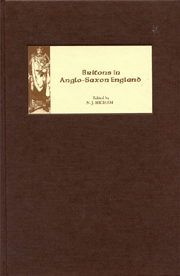Book contents
- Frontmatter
- Contents
- List of Illustrations
- List of Tables
- Contributors
- Dedication
- Acknowledgements
- Abbreviations
- 1 Britons in Anglo-Saxon England: An Introduction
- 2 Anglo-Saxon Attitudes
- 3 Forgetting the Britons in Victorian Anglo-Saxon Archaeology
- 4 Romano-British Metalworking and the Anglo-Saxons
- 5 Invisible Britons, Gallo-Romans and Russians: Perspectives on Culture Change
- 6 Historical Narrative as Cultural Politics: Rome, ‘British-ness’ and ‘English-ness’
- 7 British Wives and Slaves? Possible Romano-British Techniques in ‘Women's Work’
- 8 Early Mercia and the Britons
- 9 Britons in Early Wessex: The Evidence of the Law Code of Ine
- 10 Apartheid and Economics in Anglo-Saxon England
- 11 Welsh Territories and Welsh Identities in Late Anglo-Saxon England
- 12 Some Welshmen in Domesday Book and Beyond: Aspects of Anglo-Welsh Relations in the Eleventh Century
- 13 What Britons Spoke around 400 AD
- 14 Invisible Britons: The View from Linguistics
- 15 Why Don't the English Speak Welsh?
- 16 Place-Names and the Saxon Conquest of Devon and Cornwall
- 17 Mapping Early Medieval Language Change in South-West England
- Index
17 - Mapping Early Medieval Language Change in South-West England
Published online by Cambridge University Press: 12 September 2012
- Frontmatter
- Contents
- List of Illustrations
- List of Tables
- Contributors
- Dedication
- Acknowledgements
- Abbreviations
- 1 Britons in Anglo-Saxon England: An Introduction
- 2 Anglo-Saxon Attitudes
- 3 Forgetting the Britons in Victorian Anglo-Saxon Archaeology
- 4 Romano-British Metalworking and the Anglo-Saxons
- 5 Invisible Britons, Gallo-Romans and Russians: Perspectives on Culture Change
- 6 Historical Narrative as Cultural Politics: Rome, ‘British-ness’ and ‘English-ness’
- 7 British Wives and Slaves? Possible Romano-British Techniques in ‘Women's Work’
- 8 Early Mercia and the Britons
- 9 Britons in Early Wessex: The Evidence of the Law Code of Ine
- 10 Apartheid and Economics in Anglo-Saxon England
- 11 Welsh Territories and Welsh Identities in Late Anglo-Saxon England
- 12 Some Welshmen in Domesday Book and Beyond: Aspects of Anglo-Welsh Relations in the Eleventh Century
- 13 What Britons Spoke around 400 AD
- 14 Invisible Britons: The View from Linguistics
- 15 Why Don't the English Speak Welsh?
- 16 Place-Names and the Saxon Conquest of Devon and Cornwall
- 17 Mapping Early Medieval Language Change in South-West England
- Index
Summary
Context and methodology
THIS paper explores the potential for using evidence preserved in certain place-names to map the linguistic transition from a Brittonic to an Old English vernacular in south-west England. The traditional account of the corresponding political transition is well known. In the late sixth century the English reached the lower Severn, thereby isolating south-western Britons from their compatriots in the West Midlands and Wales. The takeover of what became Dorset and Somerset was complete by the late seventh century and, according to the Anglo-Saxon Chronicle, included battles at which the Britons were driven ‘as far as the Parrett’ and ‘as far as the sea’. During the late seventh and early eighth centuries the eastern part of British Dumnonia became English Devon. Cornwall remained independent for longer; but a Cornish bishop had submitted to Canterbury by 870, its last known king died in 875 and West Saxon kings were holding lands in Cornwall well before this. By the time that Æthelstan formalized the river Tamar as the boundary between Devon and Cornwall in the early tenth century, Cornwall had been incorporated into the emergent kingdom of England.
Despite some recognized problems with this account its basic chronology is generally accepted. yet it created an enduring image of steady West Saxon ‘conquest and settlement’ from which Britons conveniently disappear once an area comes under English control. There are, however, indications that the reality was less straightforward. Bede's account of Chad's consecration in the 660 suggests that two British bishops could (and would) travel safely to Winchester in order to assist.
- Type
- Chapter
- Information
- Britons in Anglo-Saxon England , pp. 231 - 244Publisher: Boydell & BrewerPrint publication year: 2007



